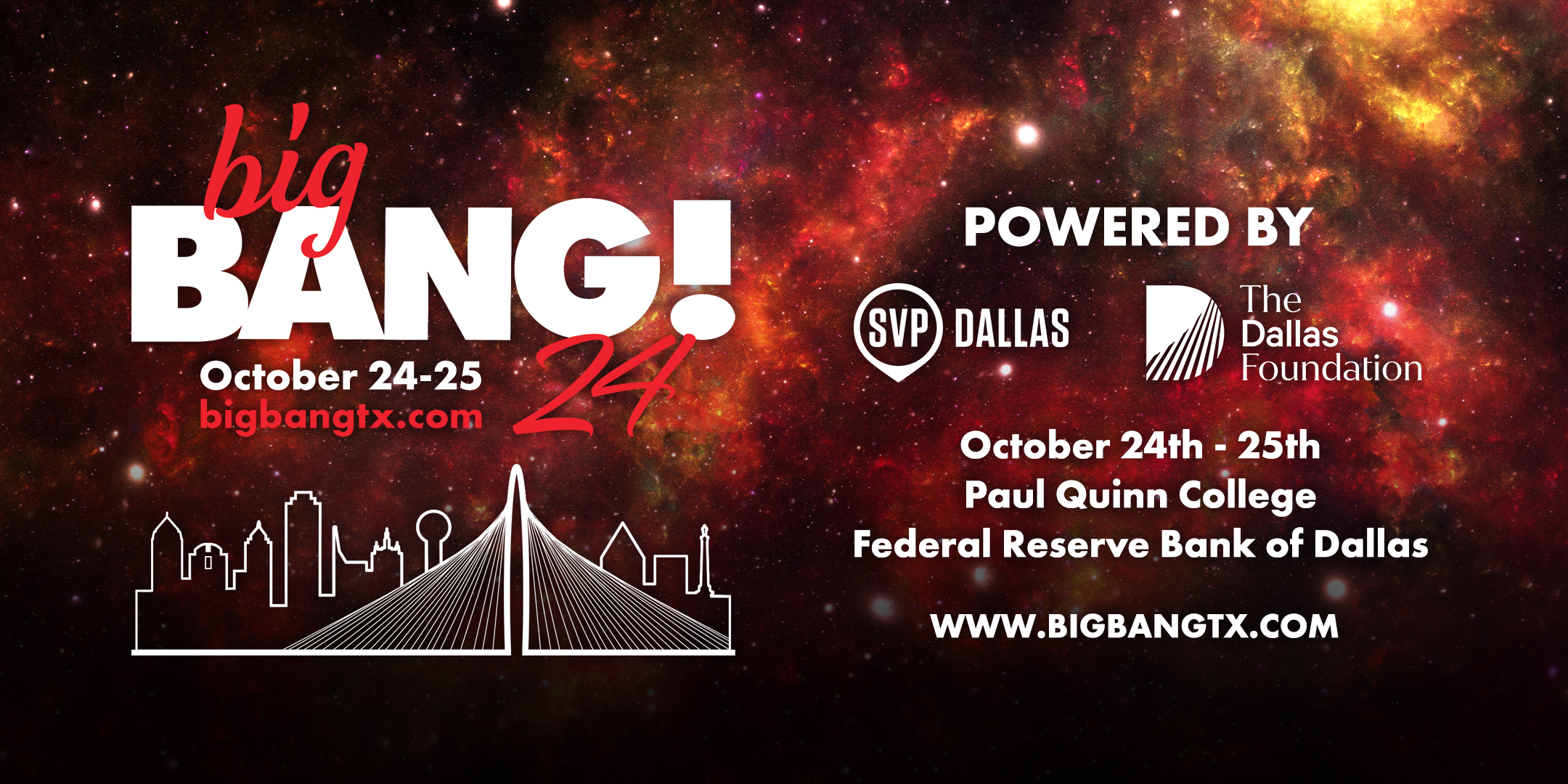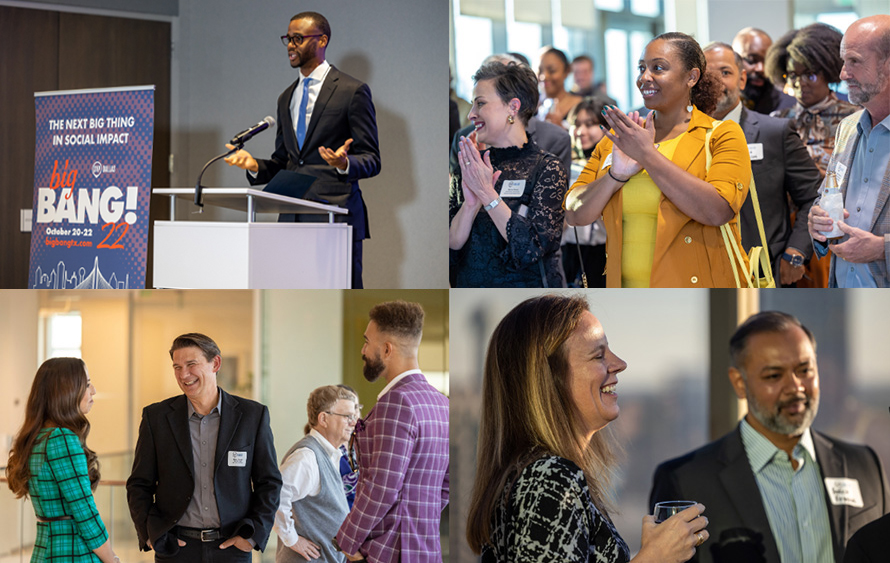Interview by Jennie Trejo. Photos provided by SVP Dallas.
As the largest social innovation convening in the region, the bigBANG! Social Impact Conference offers two immersive days of thought-provoking speakers and collaborative breakout sessions, all focused on driving equitable outcomes across Dallas and beyond. This year’s co-chairs, Michael Iyescas, Senior Manager of Corporate Social Responsibility, Global Social Impact & Fossil Foundation, and Donovan Ervin, SVP Dallas Partner and Vice President of Impact Investments at AiTi Tiedemann Global, have worked together to curate an agenda that addresses some of the most pressing challenges of our time.

We had the opportunity to sit down with Michael, who shared his personal journey and vision for this year’s conference. The theme, “The Future is Now,” will focus on building human connection in a time of rapid technological change, such as AI. Read on for his insights into how bigBANG! aims to inspire collaboration and drive real impact in DFW and beyond.
Donovan also shared his excitement about the event in a statement: “It’s an honor to be one of the co-chairs for this year’s bigBANG! Conference. As an impact investing practitioner who believes in the power of human connection, I’m grateful for the opportunity to delve into this topic with so many friends and colleagues. And it has been a joy to help curate the lineup for this conference, particularly for the second day, which is focused on Impact Investing. I’m proud to be a partner at Social Venture Partners Dallas, an organization that has helped me and so many others use our resources in service of others. Over the years, I’ve witnessed firsthand how bigBANG! is a force for good in our community. I know this year will be no exception.”

Michael: Two words: Tony Fleo. Well, actually, Tony and the team at SVP, including Seth Block. They’re incredible change-makers within the community. I have so much respect for SVP Dallas and the work they do to drive social innovation at all levels. I love how they bring together change-makers and influential community leaders across multiple sectors to address some of the biggest challenges—not just regionally, but globally. I believe everything we do has a global impact.
So, when I was asked to co-chair, I immediately jumped at the opportunity. I saw it as a chance to contribute in my own way and share what Fossil is doing as a multinational company, along with my experience in driving corporate social responsibility at a global level. It was the perfect fit.
Michael: It all started with a discussion about human connection, especially during a time when we’re facing a loneliness epidemic, mental health issues—particularly among young people—and the aftermath of the pandemic. We’ve fundamentally changed the way we work, live, and interact.
The conversation evolved into exploring what human connection looks like now. How do we aspire to connect with others today, and how has that changed, both personally and professionally? Various factors—political polarization, technology, and more—significantly influence this landscape.
I believe this theme invites us to ask the right questions and gather leaders and stakeholders to explore these vital issues. While we may end up with more questions than answers, that’s okay. This exploration is essential, and I think it’s going to be great.

Michael: Nothing gets done without conversation, right? And everything we do is human-centric, so we need platforms like bigBANG! and others to bring together the people who are actually doing the work. But I also want to stress that, while there are many conferences out there, frankly, maybe too many, not all of them convene people who are truly passionate about moving the work forward.
That’s where the challenges come through, but it’s also where the rewards are, where the success and impact are driven. So to answer your question directly, it’s about bringing together the most influential people in the community—across industries—who are passionate about these topics. From there, we can figure out how to collaborate and drive meaningful change.
I often refer to the three C’s: creating connections that foster collaboration, which builds community. You need those connections, and bigBANG! provides that platform. These connections lead to ideation, which leads to collaboration, and from there, we build community. It’s about collective impact, breaking down silos, and bringing people together—whether we’re completely aligned or not. The beauty is in coming together and having these important conversations, and that’s exactly what a space like bigBANG! offers.
Michael: It’s hard to have a conversation today that doesn’t involve AI, right? AI permeates everything we discuss—whether it’s education, employment, or any other area. It’s generating a lot of buzz, and that’s not going away. This presents an opportunity for us to consider both the impact of AI and its potential consequences.
We need to be mindful of how we leverage technology for good, as there can be significant ramifications. We’ve seen the implications of social media, for example, and the decline in mental health among our young people. Numerous books have addressed this issue.
For us, it’s about acknowledging that AI is a powerful tool—one that is almost omnipresent. We want to facilitate discussions around how we can responsibly leverage these tools. We plan to bring in speakers who are experts in the field to help us understand how we can use AI for good. Ultimately, we must remember that, as humans, we are in control of these tools.
It’s crucial to think about healthy ways to adopt AI so that it serves a purpose rather than dividing us. As we discuss human connection, we must also recognize the rise of chatbots and other AI engagement tools that can potentially replace human relationships. There are many fascinating conversations to be had around this topic at the conference.
Michael: Purpose. It’s why we show up, why we do what we do. I believe purpose is a journey, not a destination. We’re constantly refining our purpose, understanding our place in society, what we value, what we stand for, and what drives the decisions we make. AI can never replace that, in my opinion. It also can’t replicate the human-to-human touch and interaction, which is how mankind and society have existed and thrived for thousands of years—through socializing and building cooperation. It hasn’t always been perfect, but it’s how we’ve survived and evolved.
Since that’s embedded in our DNA, I believe that as we continue to create connections and build relationships today, we must keep our purpose in mind. AI can supplement interactions in ways that add value, but it can’t truly replicate the essence of human connection. I don’t think we’re at a point where AI can replace humans, nor do I believe we should aim to get there. While AI is a powerful tool, it shouldn’t replace the way we interact with one another, because that’s fundamental to our societal structures. When we start thinking of AI in terms of replacing human interactions, things can become a little fuzzy and concerning.
Michael: That’s a really good question. I always think of this work as part of an ecosystem—it’s all interrelated. bigBANG! plays a crucial role by bringing together influential leaders and stakeholders to discuss some of the most pressing, challenging, and innovative topics in the region. It’s the largest social innovation convening in the region for a reason, and that’s due to the incredible work that Tony, Seth, and their team have built over the years.
I also see bigBANG! as a starting point. I believe what comes out of it can create a ripple effect, building an ecosystem of like-minded partners and thought leaders who are passionate about this work. The goal is to mobilize these people to drive real impact. One of the key things Big Bang can do is help break down barriers and silos. We need to build more common understanding and ask, “Are we actually making a difference? Are we moving fast enough? If not, how can we get there?”
That’s the approach I’ve taken in my professional work at Fossil, and it’s something I’ve discussed with Tony, Seth, and the team at SVP. It’s about making sure there’s purpose and intentionality behind the people we bring together. Through this experience, we can start creating connections and asking, “What’s next?” Big Bang is the initiator, but the real work happens after. I’m confident that after this convening, we’ll have a roadmap to move the work forward in a meaningful way.
Sign up with your email address to receive good stories, events, and volunteer opportunities in your inbox.